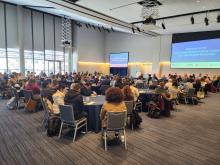
Abigail Overacre, PhD, is an Assistant Professor in the Department of Immunology at the University of Pittsburgh and a member of the Tumor Microenvironment Center (TMC) at the UPMC Hillman Cancer Center. She is a Damon Runyon Cancer Research Foundation Dale F. Frey Breakthrough Scientist awardee and a recipient of the NIAID New Innovators Award (DP2). Her laboratory promotes the understanding of how the microbiota and immune system interact and contribute to anti-tumor immunity, immunotherapy response, and immune-related adverse events (irAEs). She has authored a number of seminal papers, including those published in Cell, Immunity, and Cancer Discovery. She is a member of the Society of Immunotherapy for Cancer (SITC) Early Career Scientist Committee as well as the co-chair of the UPMC Hillman Cancer Center Women’s Initiatives Taskforce (WIT). She is passionate about her science and supporting women and minorities in STEM.
UPDATE: Join Case CCC for the 4th Annual Microbiome Conference | April 13, 2026 | Tinkham Veale University Center
IMPORTANT UPCOMING DEADLINES: Abstracts Due: Feb 16 | Last Day to Register: Mar 16
One Day. Big Ideas. Maximum Impact.
Case CCC's Microbiome Conference is now a high-impact, one-day experience—designed to deliver more value in less time.
Instead of spreading sessions across two days, the program is packed with cutting-edge presentations, a dynamic keynote, and focused discussions that get straight to what matters most for your research and practice. You’ll leave with fresh insights, new collaborators, and ideas you can use right away.
Planning to share your work? Abstracts are due February 16—don’t miss your chance to be part of the conversation.
What You’ll Get Out of Attending
Cutting-edge science you can use
Explore how microbiome research is reshaping cancer prevention, immunotherapy, metabolism, and treatment response—through sessions that bridge basic discovery, translational science, and real-world impact.
Direct access to leaders shaping the field
Engage with nationally recognized investigators, clinicians, and innovators during keynote presentations, scientific sessions, poster discussions, and networking events.
Meaningful dialogue—not just lectures
Each session is designed to spark discussion and audience interaction, providing opportunities to ask questions, exchange ideas, and build collaborations across disciplines and institutions.
A broader view of impact
Learn how microbiome science connects to community health and is relevant for everyone through programming on outreach and engagement.
Support and inspiration for the next generation
Connect with emerging scientists during trainee short talks, poster presentations, and awards—and get an energizing look at where the field is headed.
Featured Program Highlights
-
Keynote Address: Abby Overacre, PhD
Nationally recognized expert in cancer immunity and the microbiome -
Scientific Sessions:
-
Microbiome and Immunity
-
Metabolism and the Microbiome
-
Translational Approaches in Microbiome Research
-
Community Outreach and Engagement
-
A Proven, Growing Forum
The Case CCC Microbiome Conference has become a cornerstone event for fostering collaboration across academia, healthcare, industry, and community partners. Last year’s conference attracted a strong and diverse audience, and CME accreditation is in process for 2026, with anticipated growth in attendance.
Why This Conference Matters
This meeting has played a vital role in advancing the cancer microbiome research community—sparking new ideas, strengthening multi-institutional collaborations, and accelerating discoveries from bench to bedside to community.
Whether you’re advancing research, translating discoveries into care, shaping policy, or training the next generation, this conference offers insight, connection, and inspiration you can carry forward long after the final session. We look forward to seeing you in April.


